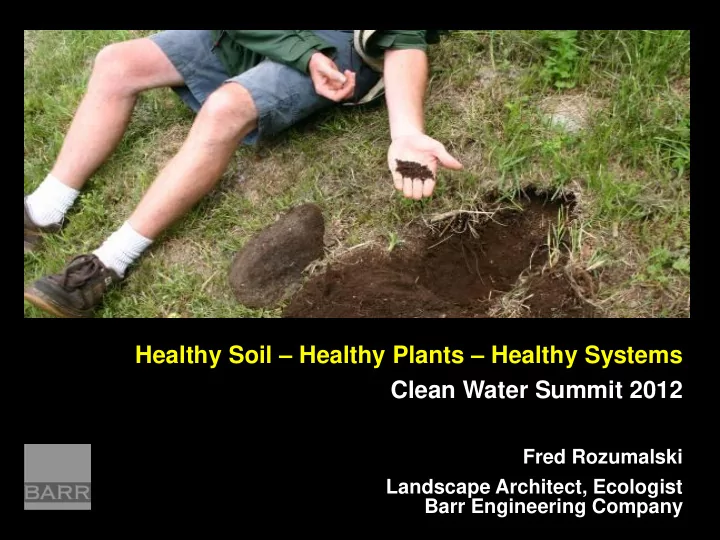

Healthy Soil – Healthy Plants – Healthy Systems Clean Water Summit 2012 Fred Rozumalski Landscape Architect, Ecologist Barr Engineering Company
Goal to manage soils to: • Readily infiltrate stormwater • Store stormwater in the upper reaches of the soil profile • Not erode
Goal: To build soils that support resilient plant communities that are: • Resist insects and disease • Drought tolerant • Productive • Low maintenance • Long lived
How? By building and retaining soil structure. Pedons
How does soil structure naturally develop?
Source: Natural Resources Conservation Service
Plants fuel the system that builds soil structure.
Mycorrhizal Fungi Bacteria
Function of Microbes • Decompose organic matter and develop humus • Bind soil particles together to form pedons • Enhance soil permeability • Promote deeper root growth and therefore greater deep root water retention • Protect plants from diseases and parasites • Retain and convert nutrients into plant available forms • Convert, degrade, or bind pollutants that find their way into soil
Benefits of Mycorrhizae: • Enhanced water and nutrient uptake • Reduced irrigation requirements • Reduced fertilizer requirements • Better drought resistance • Better pathogen resistance • Increased ability to tolerate stress • Higher transplanting success
Protozoa Nematode
Source: Natural Resources Conservation Service
Source: U.S. Post Office
Role of Plants in Soil Systems • Prevents erosion • Shade the soil which limits desiccation • Keeps soils cool • Mechanically opens the soil • Allow for better water infiltration • Allow for water storage in the upper soil profile • Feeds the microbial community • Deeply inject compost • Keep nutrients cycling
Source: The Robinson Library
4 Feet Root System of Corn 8 Weeks Old Grid equals one-square-foot boxes . 7 Feet Source: Root Development of Vegetable Crops , by John Weaver & Wm. Bruner. 1927 Root System of Mature Corn Plant
Creeping bentgrass roots In ideal growing conditions Kentucky bluegrass roots can grow 14” deep.
Soil Abuses • Compaction and crusting • Fertilizers and Pesticides • Deicing salts • Contamination
Soil Management • Prevent soil disturbance • Prevent soil erosion • Prevent soil compaction • Initiate a soil structure building process
Building Soil Structure • De-compact soil • And deeply incorporate fully decomposed compost • Introduce microbes via compost tea (maybe) • Plant nitrogen fixing and nutrient accumulating plants • Keep soil mulched • Add organic matter each year • PREVENT further soil compaction
De-compact soil
De-compact soil through double digging and incorporating compost
Compost Tea
• Avoid monocultures • Plant a diversity of species • Plant nitrogen fixing plants • Plant dynamic nutrient accumulators
Nitrogen Fixing Plants: • Hog peanut • Clovers • Alfalfa • Lead plant • New Jersey tea • Sweetfern • Wild indigos • Vetches • Black locust Nitrogen-Fixing Bacteria (Rhizobium) Nodules on Soybean Roots
Dynamic Nutrient Accumulators: • Shagbark hickory • Black walnut • Lupine • Black locust • Sorrels and docks • Comfreys • Dandelion • Basswood • Vetches Comfrey
Green Manure and Cover Crops
Mulch: • To prevent erosion • To enhance water percolation • To retain moisture and nutrients • To keep soil cool • To feed the microbial community
Stay off the soil!
Conclusion • Soils are a habitat for living organisms • Invest in your soils • Build soil structure • Feed the system every year
Healthy Soil – Healthy Plants – Healthy Systems Clean Water Summit 2012 Fred Rozumalski Landscape Architect, Ecologist Barr Engineering Company
Recommend
More recommend